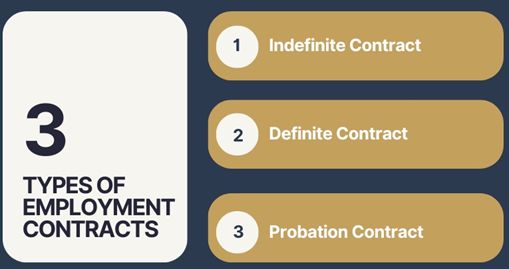I. GUIDE: POLISH LABOR LAW REGULATION
Labor law in Poland is regulated primarily by the Polish Labor
Code from 1974.
Polish Labor Code provides comprehensive regulations of:
- employment contract types,
- remote work
- remuneration,
- leaves from work,
- working time,
- employee benefits,
- health & safety at the workplace,
- obligations of the employer and the employee,
- employment contract termination.
In addition to Labor Code, there are other important acts of
law, that complement the employment regulation in Poland, i.e.:
- Act of April 13, 2007 on the National Labor Inspectorate,
- Act of October 10, 2002 on the minimum remuneration for
work, - Act of March 13, 2003 on the special rules for terminating
employment relationships with employees for reasons not related to
employees, - Act of May 23, 1991 on the trade unions and many others.
Among the sources of labor law in Poland we also distinguish
so-called internal legal acts, which binding force is limited to a
closed group of persons, i.e. all employees of a particular
enterprise. The internal acts of law include, among others:
- Work regulation,
- Remuneration regulation,
- Remote work regulation
- Social fund regulation,
- Prizes fund regulation.
Some internal regulations, such as for example work and
remuneration regulations, are mandatory to introduce in case of
employers who hire more than 50 employees. Such internal
regulations form a set of internal employer rules to which both
employees and the employer adhere
II. EMPLOYMENT CONTRACTS IN POLAND
Employment contract creates an employment relationship that
obliges an employee to perform a specific type of work for the
benefit of the employer and under his direction, at the place and
time designated by him. At the same time it creates an obligation
for the employer to pay the remuneration for the work
performed.
There are three types of employment contract in
Poland:
- probation employment contract,
- definite employment contract and
- indefinite employment contract.

These types are distinguished based on the duration and purpose
of those contracts.
1. Basic types of employment contracts
| Probation employment
contract |
Probation employment contract is a type of contract concluded
This period can last up a maximum of 3 months. This type of
Polish employment law does not allow to include a
Probation contract is not mandatory, so if the employer is not
Based on the regulations of the Labor Code the length of the
|
| Definite employment contract |
Definite employment contract is a contract
However, there are some conditions that need to be met be the
The total number of definite contracts concluded by the employer
At the same time, the employee cannot be hired by the same
Definite contracts are in no way easier to terminate than the
|
| Indefinite employment
contract |
Indefinite employment contract is a most common
It is a contract with no specific end date, which provides the
It is also most favorably perceived by banking institutions when
Such a contract may be terminated by either of the parties,
|
2. Remote work contract
Basically, any of the above-mentioned types of employment
contracts can be a basis for remote work. The employment contract
may simply mention that the employee will be working remotely and
determine a certain workplace (for example employee’s residence
address).
However, since remote work was introduced to the Polish Labor
Code in April of 2023, employers have to adhere to strict
rules when it comes to allowing remote work in the
company. The employer is responsible, among others,
for:
- providing employee with suitable equipment,
- ensuring employee’s health&safety at remote
workplace, - establishing proper rules of performing remote work
- paying out the allowance for remote work (supporting employee
in costs resulting from remote work such as electricity or
internet).
Rules of performing remote work and obligations of both parties
connected to the remote work must be properly regulated by the
employer – which may take more individual from (separate
remote work agreement with employee) or a more general form
(introducing remote work regulations in the
company). What is important, the employee cannot be allowed to
perform remote work without first agreeing on its rules.
3. Benefits of an employment contract in Poland
Concluding the employment contract provides a number of benefits
for the employee, such as:
- minimum salary (as of January 2024 it is 4242 PLN gross per
month, form July 2024 it will be 4300 PLN gross per month), - paid holiday leave,
- sick leave,
- maternity/paternity leave,
- work time standards,
- equipment provided by the employer,
- additional allowance for remote work,
- additional remuneration for overtime hours,
- protection against termination in certain circumstances,
- strict procedures for employment termination (termination
notice)
III. EMPLOYEE ONBOARDING IN POLAND
The process of onboarding in Poland is not very complicated.
However, there are some important steps that the employer must take
before the employee starts work. After the candidate accepts the
job offer the employer shall:
- Prepare employment contract and a set of HR
documents for the new hire. - Issue a medical referral for preliminary
medical examination of the employee
- before the commencement of work the employee must undergo
mandatory medical check-up. The employer bears a cost of such
examination. The examination may be organized by the employer or by
the employee on his own – in both cases the employer shall
cover the costs upfront or refund them afterwards.
- before the commencement of work the employee must undergo
- Provide health & safety training for the
employee – this may be done be the employer’s company
with help of the external provider.
- Nowadays there are many companies that offer online OHS
trainings. After the training the employee shall receive and sign
the OHS training card, which is then stored in his personal files.
However, online training is only available for employees who work
in a remote or hybrid mode. Stationary employees must undergo
training on employer’s premises or at the external
provider’s premises. Apart from the general training the
employee shall also undergo on-the-job training – OHS
training relating to his job position and workplace. Such a
training is usually conducted by a supervisor who has valid health
and safety qualifications. The OHS training shall be organized on
the first day of work.
- Nowadays there are many companies that offer online OHS
- Inform the employee about the occupational
risk related to the work position and the principles of
protection against threats. - Provide employee with personal protective
equipment free of charge – if necessary for a certain job
position. - Provide employee with clothing and work
footwear – if his or her own clothing may be destroyed or it is
necessary due to technological/sanitary requirements. - Provide equipment necessary to perform work,
e.g. laptop. For employees working for more than half of their
daily working time in front of a screen it is mandatory to provide
(apart from a laptop/computer): a mouse, a keyboard, an external
monitor. or a laptop stand. - Sign the employment contract and necessary HR
documents and deliver to the payroll company/HR department to store in the
employee’s files
- IMPORTANT: employment contract must be signed before or on the
day of commencement of work at the latest.
- IMPORTANT: employment contract must be signed before or on the
- Make sure the employee is able to work according to the medical
certificate obtained by the employee after preliminary medical
examination. - Register employee in social insurance institution
(ZUS) within 7 days of the start date indicated in the
employment contract.
IV. REMUNERATION IN POLAND
Minimum remuneration in Poland is regulated by
law and for the full-time employee performing work under the
employment contract the amount of remuneration cannot be lower than
PLN 4242 gross per month (as of January 1, 2024).
For the employees working part-time the regulations on minimum
remuneration still apply, but in this case minimum remuneration is
calculated proportionally.
| Minimum remuneration in
Poland |
PLN 4242 gross from January 1,
2024 PLN 4300 gross from July 1, 2024 |
Polish law regulates also minimum hourly wages. As of January 1,
2024 it is PLN 27.70 gross per hour. The minimum hourly wage, same
as in case of minimum remuneration, will be raised for the second
time from July 1, 2024.
| Minimal hourly wage in
Poland |
From January 1, 2024 – PLN 27.70
gross per hour From July 1, 2024 – PLN 28.10 gross per hour |
The minimum remuneration is to be raised as of July 2023. The
minimum remuneration will then amount to PLN 3600 gross per month
for a full-time employee. The minimum hourly wage will be raised to
PLN 23.50 gross per hour.
Every employment agreement in Poland is subject to
social security and health contributions, along with the obligation
to pay taxes. Under the employment
relationship the obligation to calculate, collect and pay taxes and
contributions to relevant authorities rests with the employer. As a
result employee receives ‘net salary’ – meaning the
salary after all necessary deductions.
V. WORKING TIME IN POLAND
According to the Polish Labor Code, standard working time for a
full-time employee shall not exceed 8 hours a day and 40
hours a week in an average five – day working week.
If the employee works overtime, the weekly working hours shall not
exceed 48 hours a week.
Employee is entitled to a daily rest period which
amounts to at least 11 hours of uninterrupted rest.
However, this entitlement does not apply to employees on managing
positions. Such employees are entitled to an equivalent period of
rest.
On a weekly basis the employee is entitled to a minimum
35 hour period of uninterrupted rest (while maintaining
the above-mentioned daily rest period).
Employee working at least for 6 consecutive hours a day is
entitled to a 15-minute break included in the
working time – which means that the break will not extend the
working time. After 9 consecutive hours employee receives the right
to additional 15 minute break, same in case of 16 hours of
consecutive work. Therefore, the employee has a right to the
following breaks included in the working time:
- work above 6 hours – 15 minutes
- work above 9 hours – 30 minutes
- work above 16 hours – 45 minutes
The employer may also introduce additional break from work, e.g.
a lunch break. This additional break cannot exceed
1 hour in a day and is not included in the working time (meaning
the employee’s working hours will be extended by the break
time). Such break shall result from the workplace regulations.
VI. SICKNESS AND LEAVES
Employee maintains a right to the remuneration for the period of
sickness or temporary incapacity for work. However, in some cases
the employee receives only certain a certain percentage of his
usual salary – depending of the reasons for incapacity for
work.
If the incapacity for work was caused by:
- sickness or mandatory isolation – the employee receives
80 % of usual salary; - sickness while the employee is pregnant – the employee
receives 100 % of usual salary; - accident at work or accident when travelling to work –
the employee receives 100 % of usual salary.
In case of sickness or temporary incapacity for work, the
employer is obliged to pay for the first 33 days of
incapacity (with the exception of employees over 50 years
old – in this case the employer pays only for the first 14
days).
1. Sickness benefit
After the period of first 33 days of sickness, the Social
Security (ZUS) takes over the obligation of payment and the
sick pay turns into sickness benefit. This benefit is
covered by ZUS for a period up to 182 days per year. This period is
extended to 270 days in case of a disease during pregnancy or in
case of a tuberculosis.
The exception from this rule are the employers who hire
more than 20 employees. Those employers are
obliged to pay out sickness benefits from the company
funds. However, because of that, they have a right
to deduct those amounts from the contributions they
otherwise would have to pay to the Social Security (ZUS).
2. Holiday leave
Persons hired under employment contract in Poland are entitled
to 20 or 26 days of fully paid annual leave
(so-called ‘holiday leave’). The number of days that the
employee is entitled to depends on employee’s work
seniority.
Employee is entitled to 20 days of holiday leave in a calendar
year if he/she worked for less than 10 years in their life (counted
altogether, regardless of the employer). If the employee worked for
more than 10 years he/she is entitled to 26 days of annual
leave.
Having a higher education (graduating from a university with
either a bachelor’s or a master’s degree) is equivalent to
having already 8 years of work seniority. Which means that after
two years of work, such an employee will be working for more than
10 years and will acquire the right to 26 days of annual leave.
Right to rest
As a rule, the employee acquires the right to the entirety of
annual leave on January 1st of a given calendar year. The only
exception from this rule happens in case of first year of
employment (first job in person’s life) when the right to a
leave is acquired each month, proportionally to the employment
period.
The employee should use his holiday leave within the calendar
year for which he/she acquired the right to leave. The amount of
leave can be divided into parts taken throughout the year. However,
in order to ensure employee’s rest, the law states that at
least one of the parts should last no less than 2 consecutive
weeks.
The holiday leave must be used by employee in nature and cannot
be replaced with payment or benefit of any kind. Therefore, the
employer cannot replace the leave with so called ‘holiday
bonuses’ or prevent the employee in any other way from using
the holiday leave.
Unused holiday leave
The unused leave accumulated in a certain calendar year is not
lost when the year ends and is carried over to the next calendar
year. As a rule, the employee should use his/her leave from the
previous year until the end of September of the next calendar year.
However, the employer cannot force the employee to use the
outstanding leave, he can only inform and remind the employee about
the need to use such leave.
After the 30th of September of the next calendar year the unused
holiday leave is commonly acknowledged as undue. However it does
not mean that it is lost. Holiday leave is a subject to a standard
3-years limitation period. This limitation period starts to run on
September 30th of the year following the year for which the leave
is for. For example, the outstanding leave for year 2023 will
expire after 3 years counted from September 30th, 2024 –
therefore it will expire on September 30th 2027.
There is one exception to the rule stating the employer cannot
force the employee to use the holiday leave and it takes place
during the notice period, when the employment contract is being
terminated. The employer can then force the employee to take the
leave during the notice period – otherwise the employer will
be obliged to pay out the cash equivalent for the unused leave.
3. Maternity leave
The length of maternity leave depends on the number of children
born in one childbirth and amounts to:
- 20 weeks – birth of one child
- 31 weeks – birth of two children
- 33 weeks – birth of three children
- 35 weeks – birth of four children
- 37 weeks – birth of five and more children.
If an employee has adopted a child for upbringing as a foster
family (except for a professional foster family) or has adopted a
child and submitted an application for adoption to the guardianship
court, they are entitled to leave under the conditions of maternity
leave in the same amount.
A pregnant employee may, at her request, use a maximum of 6
weeks of maternity leave before the expected date of delivery.
After giving birth, the employee is entitled to the rest of
outstanding maternity leave.
Maternity benefit
The amount of the maternity benefit received by the employee
during the maternity leave depends on when the application for the
leave is submitted to the employer.
If the employee applies for maternity and parental leave (in one
application) within 21 days after giving birth to the child –
the maternity benefit will be paid out in the amount equal to 81.5%
of salary (for the entire year during which the maternity and
parental leave last).
If the employee does not meet the deadline for requesting
maternity and parental leave – the maternity benefit will be
paid out in the amount equal to 100% of salary for the first 20
weeks, and only 70% for the period of parental leave.
4. Paternity leave
The employee who becomes a father is entitled to paternity leave
in the amount of 14 days. This leave can be divided into the
maximum of two parts. In such case none of the parts can be shorter
than 7 days. The entitlement to paternity leave belongs exclusively
to the father. The leave cannot be transferred to the child’s
mother. The paternity leave may be used until the child turns the
age of 24 months.
In the case of adoption of a child, the paternity leave is
granted until the end of 24 months from the date of entry into
force of the court sentence on the adoption of a child and no
longer than until the child reaches the age of 14.
In case of paternity leave the employee-father is entitled to a
benefit in the amount of 100 % of calculation basis.
5. Parental leave
The employee who completes the maternity leave acquires a right
to paid parental leave. The amount of parental leave is also
dependent on the number of children born at one delivery and
amounts to:
- 41 weeks if one child is born in one delivery
- 42 weeks when more than one child is born in one delivery
The above-mentioned amounts may be divided between both parents,
however each of them has a right to a non-transferrable part of 9
weeks.
Both maternity leave and parental leave, when taken one after
another, last up to one year in case when one child is born in one
delivery (for example: 20 weeks of maternity leave + 32 weeks of
parental leave). for a mother giving birth to one child).
Parental benefit
Employee shall apply to the employer in order to use a parental
leave. If the employee-mother submits her application within 21
days after the child is born – employee will receive the
benefit in the same amount throughout the entire period of
maternity and parental leave – i.e. 81.5% of calculation
basis. If this deadline is not met, the parental benefit will be
paid in the amount of 70% of calculation basis for the period of
the parental leave.
The employee-father will receive 70 % of calculation basis while
using his part of the parental leave.
Regardless of the above mentioned, an application for parental
leave shall be submitted by the employee no later than 21 days
before starting the leave.
6. Family leave
The employee who worked for a certain employer for at least 6
months is also entitled to an unpaid family leave, that can
be granted to the employee until the child reaches the age of 6.
This leave can last up to 3 years (36 months) and can be divided
into the maximum of 5 parts. Both parents or guardians of the child
are entitled to leave in this dimension jointly. Each parent or
guardian of a child has the exclusive right to one month of family
leave. This right cannot be transferred to the other parent. Since
this leave is unpaid, the employee can take up additional work for
another entities, e.g. based on civil law contracts, as long as the
work does not interfere with taking care of a child.
VII. TERMINATION OF EMPLOYMENT CONTRACT IN POLAND
There are 3 ways of terminating the employment contract in Poland.
The employment may be terminated by:
- Mutual termination agreement (MTA) – the
parties to the employment contract may agree to dissolve the
employment contract on a chosen date – the effect of such an
agreement can be immediate or delayed in time. In this kind of
agreement the parties shall regulate all the claims and issues
arising from the employment relationship, such as: payment of
remuneration, unused leave, return of company equipment,
non-compete after the term of the employment relationship,
confidentiality etc. The MTA shall have a written form (mostly for
evidentiary purposes) but there is are no strict rules as to the
form of the signature. Therefore it may be signed either with a wet
signature, a qualified electronic signature or even with a regular
electronic signature (such as DocuSign). - Termination with notice period – each
party to the contract may terminate the contract with a notice
period, by delivering the termination letter to the other party. In
such case the contract will end with the lapse of the notice
period. In Poland we have statutory notice periods regulated in the
Labor Code which cannot be decreased (however,
the parties may decide on applying longer notice periods).
The statutory notice periods in Poland depend on the work seniority
of the employee and last:
- 2 weeks – if the employee has been employed for less than 6
months, - 1 month – if the employee has been employed for at least 6
months, - 3 months – if the has been employed for at least 3 years.
When the employee is hired on the trial period contract the
statutory notice are based on the length of the trial period and
last:
- 3 days – if the trial period does not exceed 2 weeks,
- 1 week – if the trial period is longer than 2 weeks,
- 2 weeks – if the trial period is 3 months.
Termination letter must be prepared in writing.
When delivered to the employee in person it shall be signed with a
wet signature by the person entitled to represent the company. When
delivered to the employee electronically (e.g. via email) it shall
be signed with a qualified electronic signature
bought from the provider from EU’s trusted provider’s list.
Regular electronic signature such as DocuSign will not be
valid.
In case of terminating regular contracts – such as definite
and indefinite contracts, the most important formal requirement of
the termination letter is to provide a justified reason for
termination. This does not apply to the probation
contracts, which may be terminated earlier without providing a
reason. - 2 weeks – if the employee has been employed for less than 6
- Termination without notice period (so-called
‘disciplinary termination’) – one of the parties to the
contract may terminate the contract without a notice period, by
delivering the disciplinary termination letter to the other
party.
The employment contract may be terminated without notice only in
case of a gross violation of the obligations of employee (e.g.
employee comes drunk to work, does not show-up for work without
explanation for multiple days) or employer (e.g. employer has not
paid the remuneration for multiple months). The reason for
termination must be described in termination letter.
Since it is difficult to prove a gross violation – this
solution is not used very often (reserved for more extreme cases).
Such termination is also restricted with a deadline –
employer may terminate the employment contract without notice due
to the employee’s fault within one month from the date the
employer receives information about the circumstances which are the
cause of disciplinary termination.
The content of this article is intended to provide a general
guide to the subject matter. Specialist advice should be sought
about your specific circumstances.
#Labor #Employment #Law #Poland #Employee #Rights #Labour #Relations










